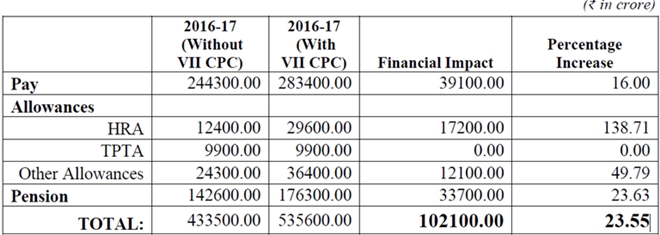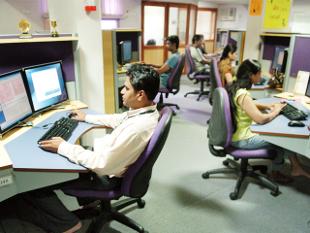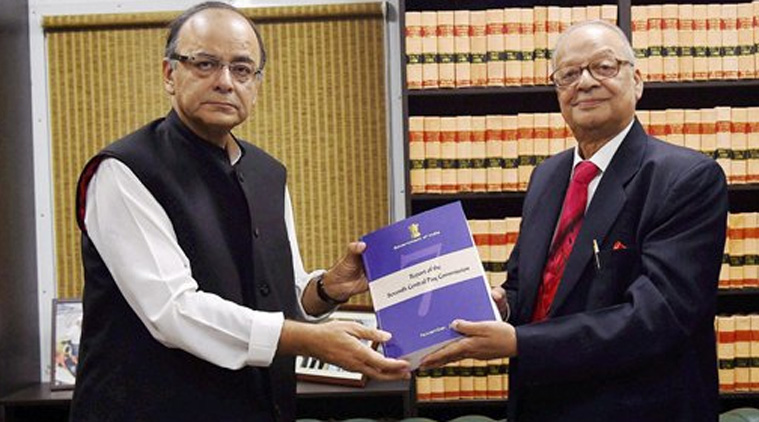7th Pay Commission calculator to highlights, here’s all you want to know
The
7th Pay Commission report recommendations have been cleared today by
the Cabinet. Earlier in its report, in November last year, the
commission itself had recommended 14.27 per cent hike in basic pay at
junior levels, the lowest in 70 years.
Here are the 7th Pay Commission report highlights:
1. Recommended Date of implementation: 01.01.2016
2.
Minimum Pay – Calculator: Based on the Aykroyd formula, the minimum pay in government is recommended to be set at Rs 18,000 per month.
3.
Maximum Pay:
Rs 2,25,000 per month for Apex Scale and Rs 2,50,000 per month for
Cabinet Secretary and others presently at the same pay level.
4.
Financial Implications:
a)
The total financial impact in the FY 2016-17 is likely to be Rs
1,02,100 crore, over the expenditure as per the ‘Business As Usual’
scenario. Of this, the increase in pay would be Rs 39,100 crore,
increase in allowances would be Rs 29,300 crore and increase in pension
would be Rs 33,700 crore.
b) Out of the total financial impact of
Rs 1,02,100 crore, Rs 73,650 crore will be borne by the General Budget
and Rs 28,450 crore by the Railway Budget.
c) In percentage terms
the overall increase in pay & allowances and pensions over the
„Business As Usual‟ scenario will be 23.55 percent. Within this, the
increase in pay will be 16 percent, increase in allowances will be 63
percent, and increase in pension would be 24 percent.
d) The total
impact of the Commission‟s recommendations are expected to entail an
increase of 0.65 percentage points in the ratio of expenditure on
(Pay+Allowances+ Pension) to GDP compared to 0.77 percent in case of VI
CPC.
5.
New Pay Structure:
Considering the issues raised regarding the Grade Pay structure and with
a view to bring in greater transparency, the present system of pay
bands and grade pay has been dispensed with and a new pay matrix has
been designed. Grade Pay has been subsumed in the pay matrix. The status
of the employee, hitherto determined by grade pay, will now be
determined by the level in the pay matrix.
6.
Fitment: A fitment factor of 2.57 is being proposed to be applied uniformly for all employees.
7.
Annual Increment: The rate of annual increment is being retained at 3 percent.
8.
Modified Assured Career Progression (MACP):
a. Performance benchmarks for MACP have been made more stringent from “Good” to “Very Good”.
b. The Commission has also proposed that annual increments not be
granted in the case of those employees who are not able to meet the
benchmark either for MACP or for a regular promotion in the first 20
years of their service.
c. No other changes in MACP recommended.
9.
Military Service Pay (MSP): The Military Service Pay, which is a
compensation for the various aspects of military service, will be
admissible to the Defence forces personnel only. As before, Military
Service Pay will be payable to all ranks up to and inclusive of
Brigadiers and their equivalents. The current MSP per month and the
revised rates recommended are as follows:
7th Pay Commission Report
| Present |
| Proposed |
|
|---|
| i. | Service Officers | Rs 6,000 | Rs 15,500 |
| ii. | Nursing Officers | Rs 4,200 | Rs 10,800 |
| iii. | JCO/ORs | Rs 2,000 | Rs 5,200 |
| iv. | Non Combatants (Enrolled) in the Air Force | Rs 1,000 | Rs 3,600 |
10.
Short Service Commissioned Officers:
Short Service Commissioned Officers will be allowed to exit the Armed
Forces at any point in time between 7 and 10 years of service, with a
terminal gratuity equivalent of 10.5 months of reckonable emoluments.
They will further be entitled to a fully funded one year Executive
Programme or a M.Tech. programme at a premier Institute.
11.
Lateral Entry/Settlement:
The Commission is recommending a revised formulation for lateral
entry/resettlement of defence forces personnel which keeps in view the
specific requirements of organization to which such personnel will be
absorbed. For lateral entry into CAPFs an attractive severance package
has been recommended.
12.
Headquarters/Field Parity: Parity between field and headquarters staff recommended for similar functionaries e.g Assistants and Stenos.
13.
Cadre Review: Systemic change in the process of Cadre Review for Group A officers recommended.
14.
Allowances:
The 7th Pay Commission has recommended abolishing 52 allowances
altogether. Another 36 allowances have been abolished as separate
identities, but subsumed either in an existing allowance or in newly
proposed allowances. Allowances relating to Risk and Hardship will be
governed by the proposed Risk and Hardship Matrix.
a. Risk and Hardship Allowance:
Allowances relating to Risk and Hardship will be governed by the newly
proposed nine-cell Risk and Hardship Matrix, with one extra cell at the
top, viz., RH-Max to include Siachen Allowance.
The current Siachen Allowance per month and the revised rates recommended are as follows:
7th Pay Commission Table
| Present |
| Proposed |
|
|---|
| i. | Service Officers | Rs 21,000 | Rs 31,500 |
| iii. | JCO/ORs | Rs 14,000 | Rs 21,000 |
This
would be the ceiling for risk/hardship allowances and there would be no
individual RHA with an amount higher than this allowance.
b.
House Rent Allowance: Since the Basic Pay has been revised upwards, the
Commission recommends that HRA be paid at the rate of 24 percent, 16
percent and 8 percent of the new Basic Pay for Class X, Y and Z cities
respectively. The Commission also recommends that the rate of HRA will
be revised to 27 percent, 18 percent and 9 percent respectively when DA
crosses 50 percent, and further revised to 30 percent, 20 percent and 10
percent when DA crosses 100 percent.
c. In the case of PBORs of
Defence, CAPFs and Indian Coast Guard compensation for housing is
presently limited to the authorised married establishment hence many
users are being deprived. The HRA coverage has now been expanded to
cover all.
d. Any allowance not mentioned in the report shall cease to exist.
e. Emphasis has been placed on simplifying the process of claiming allowances.
15. Advances:
a. All non-interest bearing Advances have been abolished.
b.
Regarding interest-bearing Advances, only Personal Computer Advance and
House Building Advance (HBA) have been retained. HBA ceiling has been
increased to Rs 25 lakhs from the present Rs 7.5 lakhs.
16. Central Government Employees Group Insurance Scheme (CGEGIS): The
Rates of contribution as also the insurance coverage under the CGEGIS
have remained unchanged for long. They have now been enhanced suitably.
The following rates of CGEGIS are recommended:
7th Pay Commission Table
| Present |
| Proposed |
|
|---|
| i. | Service Officers | Rs 21,000 | Rs 31,500 |
| iii. | JCO/ORs | Rs 14,000 | Rs 21,000 |
17. Medical Facilities:
a. Introduction of a Health Insurance Scheme for Central Government employees and pensioners has been recommended.
b.
Meanwhile, for the benefit of pensioners residing outside the CGHS
areas, CGHS should empanel those hospitals which are already empanelled
under CS (MA)/ECHS for catering to the medical requirement of these
pensioners on a cashless basis.
c. All postal pensioners should be covered under CGHS. All postal dispensaries should be merged with CGHS.
18. Pension:
The Commission recommends a revised pension formulation for civil
employees including CAPF personnel as well as for Defence personnel, who
have retired before 01.01.2016. This formulation will bring about
parity between past pensioners and current retirees for the same length
of service in the pay scale at the time of retirement.
The past
pensioners shall first be fixed in the Pay Matrix being recommended by
the Commission on the basis of Pay Band and Grade Pay at which they
retired, at the minimum of the corresponding level in the pay matrix.
This amount shall be raised to arrive at the notional pay of retirees,
by adding number of increments he/she had earned in that level while in
service at the rate of 3 percent.
In the case of defence forces personnel this amount will include Military Service Pay as admissible.
Fifty percent of the total amount so arrived at shall be the new pension.
An alternative calculation will be carried out, which will be a multiple of 2.57 times of the current basic pension.
The pensioner will get the higher of the two.
The
financial impact of the recommendations of this Commission will be
reflected through increases in expenditure on Pay, Allowances and on
Pension. The likely quantum of increase on account of each of these is
summarised below:
The
total financial impact in the FY 2016-17 is likely to be Rs 1,02,100
crore, an increase of nearly 23.55 percent over the Business As Usual
scenario. Based on the current trend, the total expenditure on Pay
(including DA, but excluding other allowances), during the year 2016-17,
without factoring in the recommendations being made by this Commission,
is expected to be Rs 2,44,300 crore. After implementation of the
recommendations of the VII CPC, this is likely to rise to Rs 2,83,400
crore, reflecting an increase of Rs 39,100 crore (16.00%).
19.
Gratuity:
Enhancement in the ceiling of gratuity from the existing Rs 10 lakh to
Rs 20 lakh. The ceiling on gratuity may be raised by 25 percent whenever
DA rises by 50 percent.
20.
Disability Pension for Armed Forces:
The Commission is recommending reverting to a slab based system for
disability element, instead of existing percentile based disability
pension regime.
21.
Ex-gratia Lump sum Compensation to Next of Kin:
The Commission is recommending the revision of rates of lump sum
compensation for next of kin (NOK) in case of death arising in various
circumstances relating to performance of duties, to be applied uniformly
for the defence forces personnel and civilians including CAPF
personnel.
22.
Martyr Status for CAPF Personnel:
The Commission is of the view that in case of death in the line of duty,
the force personnel of CAPFs should be accorded martyr status, at par
with the defence forces personnel.
23.
New Pension System:
The Commission received many grievances relating to NPS. It has
recommended a number of steps to improve the functioning of NPS. It has
also recommended establishment of a strong grievance redressal
mechanism.
24.
Regulatory Bodies: The Commission
has recommended a consolidated pay package of Rs 4,50,000 and Rs
4,00,000 per month for Chairpersons and Members respectively of select
Regulatory bodies. In case of retired government servants, their pension
will not be deducted from their consolidated pay. The consolidated pay
package will be raised by 25 percent as and when Dearness Allowance goes
up by 50 percent. For Members of the remaining Regulatory bodies normal
replacement pay has been recommended.
25.
Performance Related Pay:
The Commission has recommended introduction of the Performance Related
Pay (PRP) for all categories of Central Government employees, based on
quality Results Framework Documents, reformed Annual Performance
Appraisal Reports and some other broad Guidelines. The Commission has
also recommended that the PRP should subsume the existing Bonus schemes.
26. There are few recommendations of the Commission where there was no unanimity of view and these are as follows:
i.
The Edge: An edge is presently accordeded to the Indian Administrative
Service (IAS) and the Indian Foreign Service (IFS) at three promotion
stages from Senior Time Scale (STS), to the Junior Administrative Grade
(JAG) and the NFSG. is recommended by the Chairman, to be extended to
the Indian Police Service (IPS) and Indian Forest Service (IFoS).
Vivek Rae, Member is of the view that financial edge is justified only
for the IAS and IFS. Dr. Rathin Roy, Member is of the view that the
financial edge accorded to the IAS and IFS should be removed.
ii.
Empanelment: The Chairman and Dr. Rathin Roy, Member, recommend that All
India Service officers and Central Services Group A officers who have
completed 17 years of service should be eligible for empanelment under
the Central Staffing Scheme and there should not be “two year edge”,
vis-à-vis the IAS. Shri Vivek Rae, Member, has not agreed with this view
and has recommended review of the Central Staffing Scheme guidelines.
iii.
Non Functional Upgradation for Organised Group ‘A’ Services: The
Chairman is of the view that NFU availed by all the organised Group `A‟
Services should be allowed to continue and be extended to all officers
in the CAPFs, Indian Coast Guard and the Defence forces. NFU should
henceforth be based on the respective residency periods in the preceding
substantive grade. Shri Vivek Rae, Member and Dr. Rathin Roy, Member,
have favoured abolition of NFU at SAG and HAG level.
iv.
Superannuation: Chairman and Dr. Rathin Roy, Member, recommend the age
of superannuation for all CAPF personnel should be 60 years uniformly.
Shri Vivek Rae, Member, has not agreed with this recommendation and has
endorsed the stand of the Ministry of Home Affairs.


























